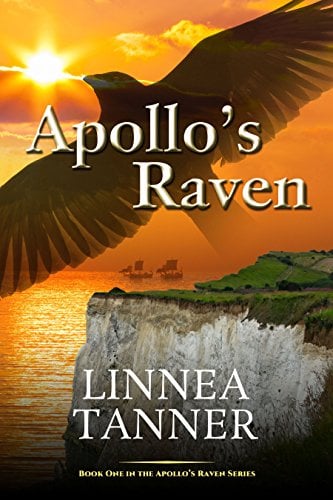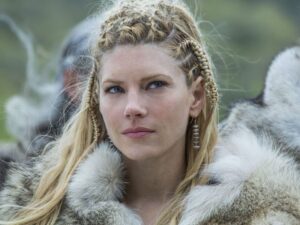
Apollo’s Raven received a 4+ star review, making it an IndieReader Approved title.
Following find an interview with author Linnea Tanner.
What is the name of the book and when was it published?
Apollo’s Raven was published in April 2017.
What’s the book’s first line?
Princess Catrin reined in her horse at the edge of the precipice overlooking the sea below to study the pattern of her raven’s flight, seeking an omen.
What’s the book about? Give us the “pitch”.
Can a Curse Control Ancient Britannia?
Celtic kings hand-picked by Rome to rule are fighting each other for power. King Amren’s former queen, a powerful Druid, has cast a curse that foretells Blood Wolf and the Raven will rise and destroy him. King Amren reveals to Princess Catrin the grim prophecy that his former queen pronounced at her execution for treason to him:
The gods demand the scales be balanced for the life you take. If you deny my soul’s journey to the Otherworld by beheading me, I curse you to the same fate as mine. I prophesy your future queen will beget a daughter who will rise as a Raven and join your son, Blood Wolf, and a mighty empire to overtake your kingdom and to execute my curse.
Catrin is trained as a warrior and discovers she is the Raven and must find a way to block the curse of the evil former queen. Torn between her forbidden love for her father’s enemy Marcellus, and her loyalty to her people, she must summon the magic of the Ancient Druids to alter the dark prophecy that awaits her.
Apollo’s Raven sweeps you into an epic Celtic tale of love, magic, adventure, intrigue, and betrayal in 24 AD Ancient Rome and Britannia.
What inspired you to write the book? A particular person? An event?
As a young girl, I was an avid reader of mythology and legends that portrayed females as goddesses, Amazonian warriors, and cunning sorceresses. I’ve always been drawn to bigger than life epic heroes and heroines who steered the course of their people. In my travels to London, I was struck by the statue of Boudica and her daughters riding in a chariot near the Thames River. I learned of how the celebrated warrior queen united the Britons in a revolt against the Romans whom they almost threw out of Britannia in 61 AD. The Roman historian Dio Cassius describes Boudica as having the mystical powers of a Druid: “When she [Boudica] had finished speaking, she employed a species of divination, letting a hare escape from the fold of her dress; and since it ran on what they considered the auspicious side, the whole multitude shouted with pleasure, and Boudica, raising her hand toward heaven, said: “I thank you, Andraste, and call upon you as woman speaking to woman … I beg you for victory and preservation of liberty.”
After doing more research, I became fascinated with the enigmatic Celts who were renowned as warriors, Druids, and craftsmen. In preparation for writing the Apollo’s Raven series, I extensively researched and traveled to sites in the United Kingdom and France which are described in the first and upcoming books in the series.
What’s the main reason someone should really read this book?
Apollo’s Raven is a historical romantic fantasy that not only entertains, but introduces readers to the mystical world of the tribal Celtic kingdoms where women were held in higher esteem that contrasts sharply to the paternalistic, empire-building Romans.
What’s the most distinctive thing about the main character? Who-real or fictional-would you say the character reminds you of?
The Celtic Warrior Princess Catrin demonstrates both vulnerability and unflinchingly as her love for the Roman enemy and loyalty to her people are tested. With the aid of her raven spirit, she gains the power of foresight that helps her make difficult decisions. She embodies real-life Celtic warrior queens from history, such as Boudica, and goddesses from mythology, such as Morrigan.
If they made your book into a movie, who would you like to see play the main character(s)?
Katheryn Winnick who plays Lagertha on The Vikings evokes the powerful and sensual aspect for the main heroine, Catrin. The actor who originally inspired my vision for Marcellus was Andy Whitfield who played the role of Spartacus but later tragically died at age 39 of cancer.
When did you first decide to become an author?
As a young girl, I devoured books on Greek and Nordic mythology while my friends were reading Nancy Drew mysteries. By eighth grade, I was reading adult historical fiction. Since then it has always been my passion to become an author and write about bigger than life characters, although it was not until later in life when I wrote in earnest.
Is this the first you’ve written?
Apollo’s Raven is the fourth book that I have written in the series. After I received feedback on my earlier books, it became clear that I needed to start the series earlier and to expand on the Celtic mysticism and the political strife among the tribal kingdoms in Britannia and Rome’s heavy-handed influence on their politics.
What do you do for work when you’re not writing?
I retired in 2010 from the pharmaceutical industry where I worked as a chemist and regulatory affairs liaison. Depending on the time of day and season of the year, I now explore and research ancient and medieval history, mythology and archaeology to support my writing. I’ve traveled to many sites in the United Kingdom and France which are described in the Apollo’s Raven series.
What’s the best and the hardest part of being an indie?
As an indie author, I have complete control over which vendors I use to help me edit the manuscript, design the book, narrate the audio book, and publish and distribute the various formats of the book. I can publish more quickly than a traditional publisher. The hardest part is wearing different hats as an independent publisher, publicist, marketer, and accountant. Launching the first book took significant time away from my writing. Hopefully, I’ll become more proficient as I publish more books.
Would you go traditional if a publisher came calling? If so, why?
Under the right circumstances, I would consider a traditional publisher if doing so would enhance the possibility of selling my books worldwide and for opening other opportunities. I believe that my experience in social networking and for gathering followers would contribute to the partnership.

The desire to learn and to master new skills motivates me. As an author, I want to continue honing my craftsmanship and discovering new ideas for other books. Part of the joy of writing is doing the up-front research to help create the story.
Which writer, living or dead, do you most admire?
William Shakespeare.

